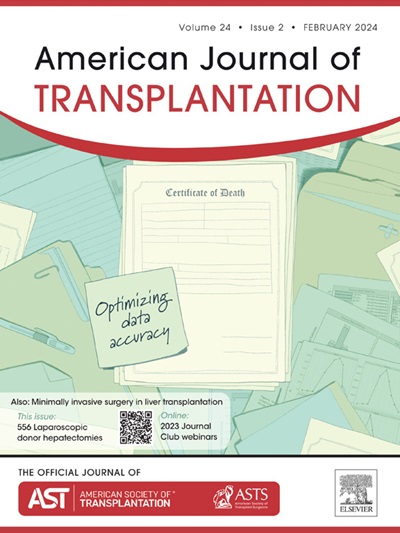2025年STAR供体来源细胞游离DNA工作组报告:建立分析有效性作为适当和有效临床应用的基础。
IF 8.2
2区 医学
Q1 SURGERY
引用次数: 0
摘要
移植致敏:风险评估(STAR)倡议下的一个工作组于2023年成立,旨在制定基于实验室的供体来源的无细胞DNA (dd-cfDNA)检测的分析和临床有效性指南。在过去的几年里,dd-cfDNA的测量作为一种微创的同种异体移植损伤标志物已经得到了更广泛的应用。迄今为止,各种技术和定量方法阻碍了结果的标准化和解释,导致对如何在移植中最好地利用cfDNA的理解存在差异。正在制定用于当地实验室检测的试剂盒,但我们缺乏有组织的实验室质量保证框架。此外,阈值和测量方法随着时间的推移而变化,表明测定敏感性和临床相关性仍在不断完善。随着该领域向以当地实验室为基础的测试迈进,协调和可重复性将是至关重要的。该工作组的目标是审查和分析可能导致结果差异的技术和生物学变量以及临床环境,这些差异最终将影响临床有效性和效用。高质量、标准化的分散式dd-cfDNA检测是开展真实世界证据生成多中心研究的必要先决条件,以便为这一有前途的检测方法建立适当的使用环境。本文章由计算机程序翻译,如有差异,请以英文原文为准。
2025 Report of the STAR Working Group on Donor Derived Cell Free DNA: Establishing Analytical Validity as the Basis for Appropriate and Effective Clinical Utilization.
A working group under the Sensitization in Transplant: Assessment of Risk (STAR) initiative was established in 2023 to develop guidelines for analytic and clinical validity of lab-based testing for donor-derived cell-free DNA (dd-cfDNA). Measurement of dd-cfDNA as a minimal invasive marker of allograft injury has become more widely used over the last few years. To date, various technical and quantitation methods have hindered standardized and interpretation of the results, leading to variability in understanding how to best utilize cfDNA in transplantation. Kits are being formulated for local laboratory testing, but we lack an organized framework for laboratory quality assurance. Further, threshold values and methods of measurement have changed over time, indicating that assay sensitivity and clinical relevance are still being refined. Harmonization and reproducibility will be critical as the field moves forward to local laboratory-based testing. The goal of this work group was to review and analyze technical and biological variables, and clinical settings that could contribute to disparities in results, which will ultimately influence clinical validity and utility. High-quality, standardized de-centralized dd-cfDNA testing is the essential pre-requisite for conducting real-world evidence generating multicenter studies to establish the appropriate context of use for this promising assay.
求助全文
通过发布文献求助,成功后即可免费获取论文全文。
去求助
来源期刊
CiteScore
18.70
自引率
4.50%
发文量
346
审稿时长
26 days
期刊介绍:
The American Journal of Transplantation is a leading journal in the field of transplantation. It serves as a forum for debate and reassessment, an agent of change, and a major platform for promoting understanding, improving results, and advancing science. Published monthly, it provides an essential resource for researchers and clinicians worldwide.
The journal publishes original articles, case reports, invited reviews, letters to the editor, critical reviews, news features, consensus documents, and guidelines over 12 issues a year. It covers all major subject areas in transplantation, including thoracic (heart, lung), abdominal (kidney, liver, pancreas, islets), tissue and stem cell transplantation, organ and tissue donation and preservation, tissue injury, repair, inflammation, and aging, histocompatibility, drugs and pharmacology, graft survival, and prevention of graft dysfunction and failure. It also explores ethical and social issues in the field.

 求助内容:
求助内容: 应助结果提醒方式:
应助结果提醒方式:


